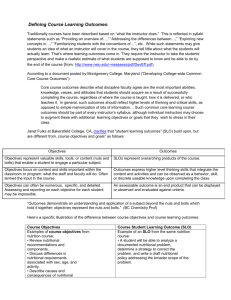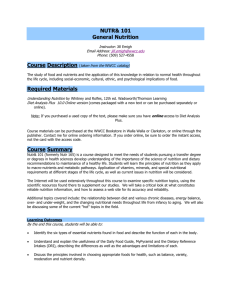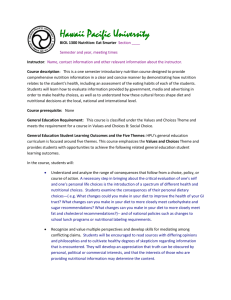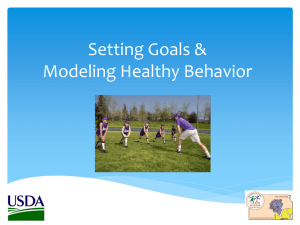HLTH120-03_Spr05_JL.doc - Heartland Community College
advertisement
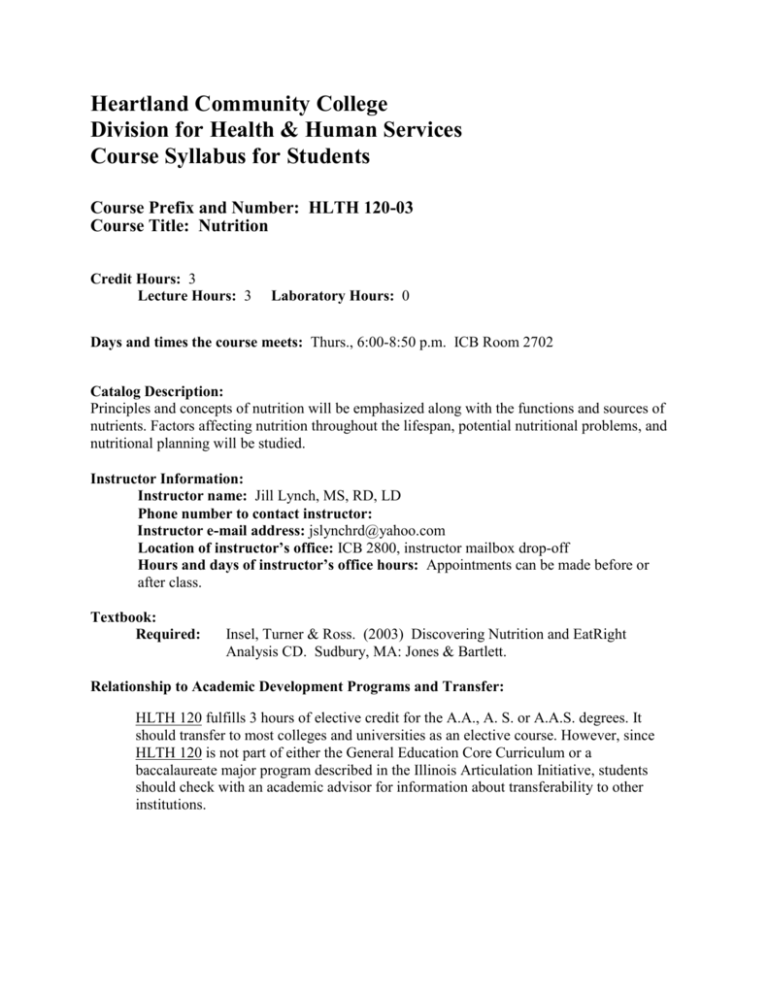
Heartland Community College Division for Health & Human Services Course Syllabus for Students Course Prefix and Number: HLTH 120-03 Course Title: Nutrition Credit Hours: 3 Lecture Hours: 3 Laboratory Hours: 0 Days and times the course meets: Thurs., 6:00-8:50 p.m. ICB Room 2702 Catalog Description: Principles and concepts of nutrition will be emphasized along with the functions and sources of nutrients. Factors affecting nutrition throughout the lifespan, potential nutritional problems, and nutritional planning will be studied. Instructor Information: Instructor name: Jill Lynch, MS, RD, LD Phone number to contact instructor: Instructor e-mail address: jslynchrd@yahoo.com Location of instructor’s office: ICB 2800, instructor mailbox drop-off Hours and days of instructor’s office hours: Appointments can be made before or after class. Textbook: Required: Insel, Turner & Ross. (2003) Discovering Nutrition and EatRight Analysis CD. Sudbury, MA: Jones & Bartlett. Relationship to Academic Development Programs and Transfer: HLTH 120 fulfills 3 hours of elective credit for the A.A., A. S. or A.A.S. degrees. It should transfer to most colleges and universities as an elective course. However, since HLTH 120 is not part of either the General Education Core Curriculum or a baccalaureate major program described in the Illinois Articulation Initiative, students should check with an academic advisor for information about transferability to other institutions. Course Objectives (Learning Outcomes): Upon successful completion of the course, the student will be able to: 1. 2. 3. 4. 5. 6. 7. 8. 9. 10. 11. 12. 13. 14. Describe good nutrition as it relates to an individual's health status, metabolism, energy requirements, culture, and life style. Explain the functions of the essential nutrients. Identify the dietary sources of the essential nutrients. Describe the clinical syndromes that result from nutritional deficiencies and excesses. Explain how carbohydrates, fats, and proteins are metabolized and stored by the body. Explain the purpose of the Food Guide Pyramid. Interpret food labels as they relate to nutritional planning. Develop a nutritional plan for children, adolescents, adults, and the elderly incorporating the recommended daily servings from the Food Guide Pyramid. Describe the variables that influence dietary practices, including culture, religion, income, lifestyle, and health status. Conduct a nutritional assessment. Explain the purpose and restrictions of various therapeutic diets studied. Develop meal plans for the therapeutic diets studied incorporating the variables that affect dietary practices. Demonstrate the ability to provide dietary teaching. Identify the community agencies that provide nutritional services. Course Outlines: I. Introduction A. Factors Influencing Dietary Practices B. Basic Principles/Vocabulary C. Nutrition Quackery and Reliable Information II. Essential Macronutrients A. Water B. Carbohydrates C. Lipids and Heart Disease D. Proteins and Vegetarianism III. Essential Macronutrients A. Vitamins B. Minerals C. Phytochemicals D. Supplements E. Cancer Implications IV. Application A. Food Pyramid B. Food Labels C. Digestion Absorption V. Dieting VI. VII. A. Metabolism B. Fad Diets C. Eating Disorders Nutrition Through the Ages A. Pregnancy, Breast-feeding and Infancy B. Childhood and Adolescence C. Adults D. Assessment E. Dietary Teaching F. Community Agencies Food and Health A. Food Safety B. Food Allergies/intolerances Course Policies: Method of Evaluation (Tests/Exams, Grading System): You will be graded on the following: Unit Tests 2 @ 100 pts each Written Assignments In-class Assignments 10 pts each Nutrition Assessment 150 pts Case Study 100 pts Group Project 100 pts Final exam 200 pts In-Class Participation 50 pts (also factored into total grade) Grading Policy: Grading Scale: A B C D F 90-100% 80-89% 70-79% 60-69% 59% and below Participation (or Attendance): It is your responsibility to attend class. Since this class only meets once per week, we will cover a large amount of material at each class. In-class assignments and participation points cannot be made up if a class is missed. Class Participation: You will be expected to participate in class discussions and in-class assignments. Your participation will be included in your final grade. Make-up of tests and assignments: Tests and assignments cannot be made up. If you miss a scheduled test or do not turn in an assignment on the due date, you will receive no points. Exceptions may be made in the event of a family or medical emergency when advance notice is given to the instructor. An excused absence and make-up date will be granted at the discretion of the instructor. Deadlines: Test dates and assignment due dates are included in the course calendar. The instructor will provide notice of at least one week should these dates change. Required Writing and Reading: Required reading includes the class text and additional readings assigned in class. Supplemental readings are short articles taken from professional journals, the newspapers, popular magazines, and the Internet. Writing is required for the exams and assignments. Students will be required to develop written nutritional plans according to guidelines distributed by the instructor. Academic Integrity and Plagiarism Academic Integrity Academic integrity is a fundamental principle of collegial life at Heartland Community College and is essential to the credibility of the College’s educational programs. Moreover, because grading may be competitive, students who misrepresent their academic work violate the right of their fellow students. The College, therefore, views any act of academic dishonest as a serious offense requiring disciplinary measures, including course failure, suspension, and even expulsion from the College. In addition, an act of academic dishonesty may have unforeseen effects far beyond any officially imposed penalties. Violations of academic integrity include, but are not limited to cheating, aiding or suborning cheating or other acts of academic dishonesty, plagiarism, misrepresentation of data, falsification of academic records or documents and unauthorized access to computerized academic or administrative records or systems. Definitions of these violations may be found in the college catalog. Plagiarism Plagiarism is the presenting of others’ ideas as if they were your own. When you write a paper, create a project, do a presentation or create anything original, it is assumed that all the work, except for that which is attributed to another author or creator, is your own. Plagiarism is considered a serious academic offense and may take the following forms: 1 Copying word-for-word from another source and not giving that source credit. 2 Paraphrasing the work of another and not giving that source credit. 3 Adopting a particularly apt phrase as your own. 4 Using an image or a copy of an image without crediting its source. 5 Paraphrasing someone else’s line of thinking in the development of a topic as if it were your own. 6 Receiving excessive help from a friend or elsewhere, or using another project as if it were your own. Note that word-for-word copying is not the only form of plagiarism. The penalties for plagiarism may be severe, ranging from failure on the particular piece of work, failure in the course or expulsion from school in extreme cases. [Adapted from the Modern Language Association’s MLA Handbook for Writers of Research Papers. New York: MLA, 1995: 26] Support Services: Heartland Library Information The Library, located in the Students Commons Buildings at the Raab Road campus, provides Heartland students with a full range of resources including books, online journal databases, videos, newspapers, periodicals, reserves, and interlibrary loan. Librarians are available to assist in locating information. For more information please call the Library (309) 268-8200 or (309) 268-8292 Tutoring Center Heartland Community College offers tutoring in various forms at no cost to Heartland students at the Academic Support Center (ASC) in Normal and at the Pontiac and Lincoln Centers. Tutors are available at convenient times throughout the week. Study groups, group tutoring facilitated by a specially-trained tutor, are also available by request. For more information about services available at each location, please call the ASC in Normal (309) 268-8231; the Pontiac Center (815) 842-6777; the Lincoln Center (217) 735-1731. Testing Center The Testing Center provides a quite environment for students to complete make-up exams, online exams, and exams for students with special accommodations. Students may be able to complete exams in the Testing Center if arrangements are made with their instructor. For more information, contact the Testing Center at (309) 268-8231. Syllabi disclaimer: The following course calendar should be considered tentative. The instructor will attempt to adhere to the schedule as closely as possible, but changes will be made as needed. Course Calendar: WEEK Week 1 (Jan 20) Intro of self/class, discuss syllabus Topic: Intro to Nutrition, Food Guide Pyramid ASSIGNMENTS Chapters 1,2,3 Week 2 (Jan 27) Topic: Food Labels, Complementary Nutrition, Nutrition and the Human Body Chapter 4,5 Week 3 (Feb 3) Topic: Carbohydrates Review for Test 1 Week 4 (Feb 10) TEST 1 Topic: Lipids Chapters 6,7, Spotlight on Metabolism Week 5 (Feb 17) Topic: Lipids, Protein Intro to Nutrition Assessment Assignment Spotlight on Alcohol, Chapter 9 Week 6 (Feb 24) Topic: Alcohol, Vitamins, Water Chapter 10 Week 7 (March 3) National Nutrition Month Topic: Water Intro to Group Project Week 8 (March 10) TEST 2 Topic: Minerals Review for Test 2 Chapter 8 Week 9 ( March 17 Spring Break—No Class) Week 10 (March 24) Topic: Energy Balance/Weight Control Nutrition Assessment Assignment Due Spotlight on Eating Disorders Week 11 (March 31) Topic: Eating Disorders Chapter 12 Group Project Due Week 12 (April 7) Topic: Maternal and Infant Nutrition Chapter 13 Week 13 (April 14) Topic: Child and Adult Nutrition Intro to Case Study Assignment Chapters 11,14 Week 14 (April 21) Topic: Sports nutrition, Food safety Chapter 15 Week 15 (April 28) Week 16 (May 5) Topic: Malnutrition Week 17 (May 12) Class summary, final exam review FINAL EXAM (May 19) Good luck!! Case Study Due


